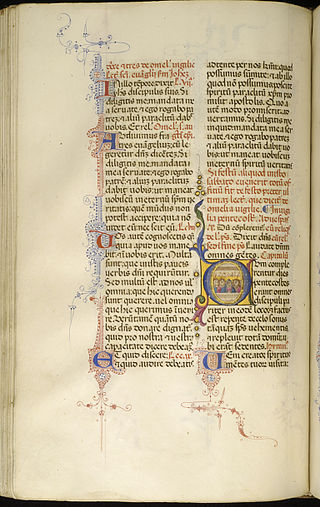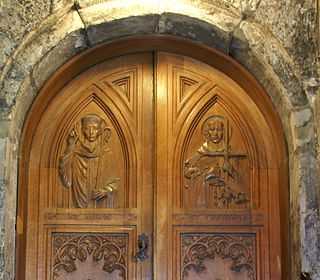Related Research Articles

The Roman Breviary is a breviary of the Roman Rite in the Catholic Church. A liturgical book, it contains public or canonical prayers, hymns, the Psalms, readings, and notations for everyday use, especially by bishops, priests, and deacons in the Divine Office.

Bruno of Cologne, venerated as Saint Bruno, was the founder of the Carthusian Order. He personally founded the order's first two communities. He was a celebrated teacher at Reims, and a close advisor of his former pupil, Pope Urban II. His feast day is 6 October.

Saint Mirin was born in 565, is also known as Mirren of Benchor, Merinus, Merryn and Meadhrán. The patron saint of the town and Roman Catholic diocese of Paisley, Scotland, he was the founder of a religious community which grew to become Paisley Abbey. The shrine of this saint in the abbey became a centre of pilgrimage.

The Diocese of Växjö is one of 13 dioceses within the Lutheran Church of Sweden. It's episcopal see is located in the city of Växjö. The diocese was established in the 12th century as a Roman Catholic bishopric, but was taken over by the Church of Sweden as a result of the Protestant Reformation in Sweden.

Peter Chrysologus was Bishop of Ravenna from about 433 until his death. He is known as the "Doctor of Homilies" for the concise but theologically rich reflections he delivered during his time as the Bishop of Ravenna.
Saint Regulus or Saint Rule was a legendary 4th century monk or bishop of Patras, Greece who in AD 345 is said to have fled to Scotland with the bones of Saint Andrew, and deposited them at St Andrews. His feast day in the Aberdeen Breviary is 17 October.

Machar was a 6th-century Irish Saint active in Scotland.
Saint Fergus was a bishop who worked in Scotland as a missionary.

Saint Moluag was a Scottish missionary, and a contemporary of Saint Columba, who evangelized the Picts of Scotland in the sixth century. Saint Moluag was the patron saint of Argyll as evidenced by a charter in 1544, from the Earl of Argyll, which states "in honour of God Omnipotent, the blessed Virgin, and Saint Moloc, our patron". The House of Lorne became the kings of Dalriada and eventually united with the Picts to become the kings of Scots.

The Aberdeen Breviary is a 16th-century Scottish Catholic breviary. It was the first full-length book to be printed in Edinburgh, and in Scotland.
The Archbishop of Dublin is the head of the Archdiocese of Dublin in the Catholic Church, responsible for its spiritual and administrative needs. The office has existed since 1152, in succession to a regular bishopric since 1028. The archdiocese is the metropolitan see of the ecclesiastical province of Dublin, and the archbishop is also styled the Primate of Ireland. The cathedral church of the archdiocese is Saint Mary's Pro-Cathedral in Dublin city, although the Church formally claims Christ Church as its cathedral, and the archbishop's residence is Archbishop's House in Drumcondra.

The Diocese of Aberdeen is a diocese of the Latin Church of the Catholic Church in Scotland.

The Archdiocese of Glasgow is the Latin Catholic metropolitan see of the Province of Glasgow in central Scotland. The episcopal seat of the developing diocese was established by Saint Kentigern in the 6th century AD. It is one of two catholic metropolitan archdioceses of the Catholic Church in Scotland: the only archdioceses in Scotland. It is the elder of the two bishoprics. Innocent VIII first raised Glasgow a metropolitan archbishopric in 1492. The Metropolis has the dioceses of Motherwell and Paisley as suffragans within the Ecclesiastical Province.

October 29 - Eastern Orthodox liturgical calendar - October 31

Gregory Lawrence Parkes is an American prelate of the Roman Catholic Church. Parkes has been serving as the fifth bishop of the Diocese of St. Petersburg in Florida since 2017. He served as bishop of the Diocese of Pensacola-Tallahassee in Florida from 2012 to 2016.

John Keenan is the bishop of the Diocese of Paisley in Scotland. His appointment by Pope Francis was announced on 8 February 2014. He is the fifth Bishop of Paisley.

A breviary is a liturgical book used in Christianity for praying the canonical hours, usually recited at seven fixed prayer times.

St. Lesmo of Glen Tanar is the name given to a holy hermit who it is believed lived in Glen Tanar Aberdeenshire Scotland in the eighth century. He is recorded by Thomas Dempster as a "saint" in the seventeenth century. His claimed Saints’ Day is 9 December.
Saint Irchard was a Scottish missionary and bishop.
Saint Vimin was a Scottish abbot and bishop. He is said to have founded Holywood Abbey in Fife, Scotland. However, there are no reliable sources for his life. His feast day is 21 January.
References
- Attribution
 This article incorporates text from a publication now in the public domain : Herbermann, Charles, ed. (1913). "St. Tarkin". Catholic Encyclopedia . New York: Robert Appleton Company.
This article incorporates text from a publication now in the public domain : Herbermann, Charles, ed. (1913). "St. Tarkin". Catholic Encyclopedia . New York: Robert Appleton Company.